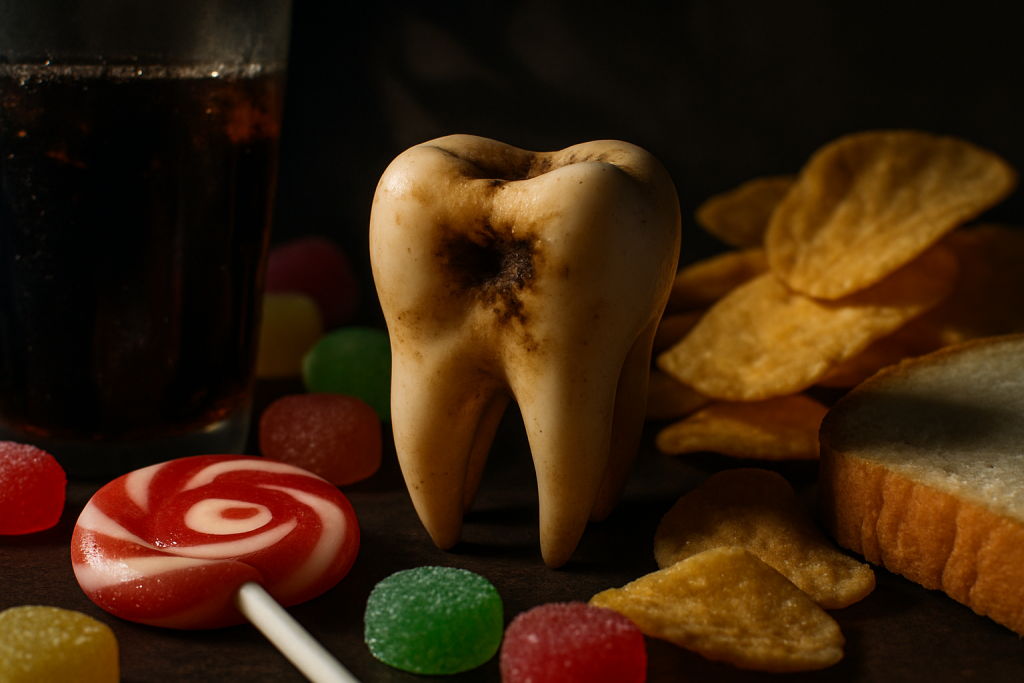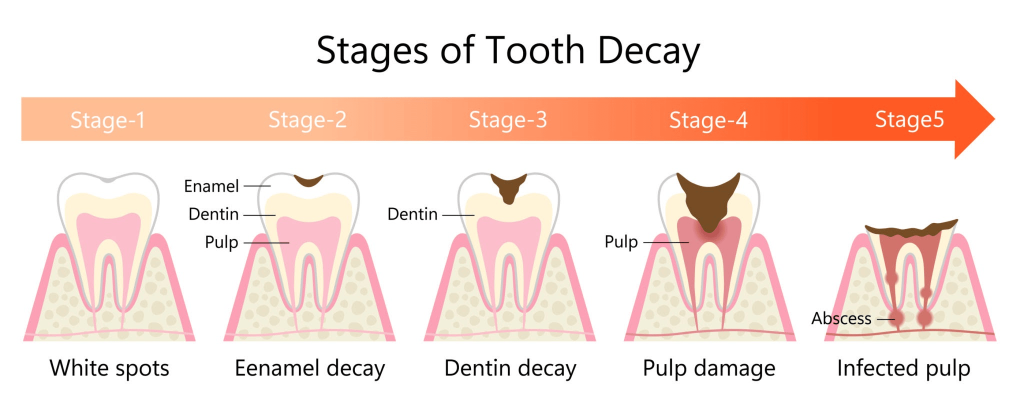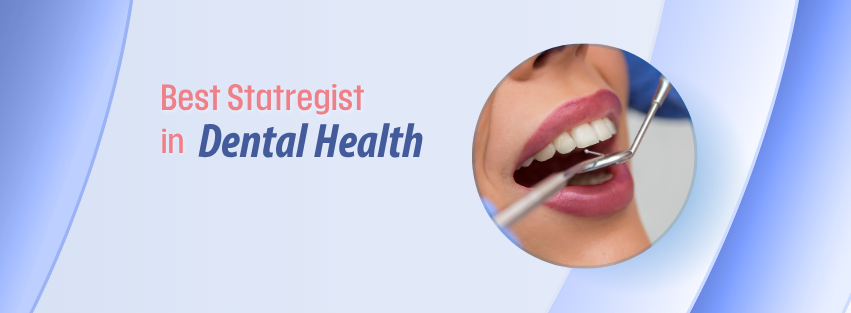
Tooth decay is a common dental problem that can lead to pain, infection, and even tooth loss if not addressed. If you’re asking yourself how you can permanently fix your tooth decay, you’re not alone. Many people look for effective and lasting solutions. Here are several strategies to consider for protecting your teeth and maintaining good oral health.
Understanding tooth decay:
Before we dive into solutions, it’s important to understand what tooth decay is. It begins when bacteria in your mouth produce acids that erode the tooth’s enamel. Factors such as poor diet, lack of oral hygiene, and genetics contribute to this process. Recognizing the symptoms, like sensitivity and visible holes in your teeth, is the first step towards treatment.
Prevention through diet:

Your diet plays a key role in maintaining dental health. Here are some dietary tips to prevent tooth decay:
- Limit Sugar Intake: Foods and drinks high in sugar can lead to acid production, increasing the risk of decay.
- Eat Calcium-Rich Foods: Dairy products, leafy greens, and almonds help strengthen your teeth.
- Snack Wisely: Opt for healthy snacks like fruits, nuts, and whole grains instead of sugary snacks.
- Drink Water: Water helps wash away food particles and bacteria. Fluoridated water provides extra protection.
Daily oral hygiene routine:
A robust oral hygiene routine is essential for tackling tooth decay. Here are five key practices:
- Brush Twice a Day: Use fluoride toothpaste and a toothbrush with soft bristles. Brushing after meals is ideal, but twice daily is essential.
- Floss Daily: Flossing removes plaque and food particles from between your teeth that brushing alone can miss.
- Use Mouthwash: An antimicrobial mouthwash can help kill bacteria and freshen your breath.
- Regular Dental Visits: Schedule check-ups at least twice a year. Your dentist can spot early signs of decay and advise treatments.
- Consider Sealants: Dental sealants are protective coatings that can be applied to the chewing surfaces of back teeth. They can shield against decay, especially if you’re prone to cavities.
Professional treatments:
If you’re already experiencing tooth decay, professional treatments may be necessary. Here are some options:
- Fillings: If decay has progressed, your dentist may need to remove the damaged area and fill it with materials like composite resin or amalgam.
- Crowns: In cases of severe decay where the tooth structure is compromised, a crown may be placed over the tooth to restore its shape and function.
- Root Canals: If decay reaches the pulp, a root canal might be essential to remove infected tissue and seal the tooth.
Natural remedies:
While not a substitute for professional treatment, some natural remedies can support your dental health:
- Oil Pulling: Swishing coconut or sesame oil in your mouth for about 15-20 minutes can reduce harmful bacteria.
- Green Tea: Its natural fluoride content and antioxidants may help combat bacteria.
- Healthy Bone Broth: Rich in minerals, it can help remineralize your teeth.
Maintaining Long-Term dental health:
Permanently fixing tooth decay not only involves treatment but also committing to long-term dental health. To maintain healthy teeth, make regular dental check-ups a habit, continue practicing good oral hygiene, and adjust your diet for better dental health. By combining preventative strategies, professional help, and natural remedies, you can vastly improve your dental health and reduce the risk of tooth decay.
The role of nutrition in preventing tooth decay:
Your diet plays a critical role in your oral health, especially when it comes to preventing tooth decay. The food you eat can either support your teeth and gums or lead to serious dental issues. Understanding how nutrition impacts your dental health is key to maintaining a beautiful, healthy smile.
Tooth decay occurs when harmful bacteria in the mouth produce acids that erode tooth enamel. This process can be accelerated by a diet high in sugar and refined carbohydrates.
When you consume sugary snacks or drinks, the bacteria in your mouth feast on those sugars, creating acidic byproducts that can harm your teeth. Therefore, focusing on a balanced diet is essential in combating tooth decay.
Here are some important nutrients and foods that can help protect your teeth:
- Calcium: This mineral is crucial for maintaining strong teeth and bones. Foods rich in calcium include dairy products like milk, cheese, yogurt, and leafy green vegetables like kale and broccoli. A diet rich in calcium can help strengthen tooth enamel and prevent decay.
- Vitamin D: This vitamin helps your body absorb calcium effectively. Sunlight is a natural source of Vitamin D, but you can also find it in fortified foods such as milk and cereals, as well as fatty fish like salmon and mackerel. Ensuring you have adequate Vitamin D can enhance your oral health.
- Phosphorus: Phosphorus works in tandem with calcium and Vitamin D to strengthen tooth enamel. Good sources of phosphorus include meat, fish, eggs, dairy products, nuts, and whole grains.
- Vitamin C: Not only does Vitamin C boost your immune system, but it also contributes to healthy gums. Citrus fruits, strawberries, bell peppers, and broccoli are excellent sources of Vitamin C. This vitamin helps your body produce collagen, a protein that supports the structure of your gums.
- Fiber: Eating high-fiber foods encourages saliva production, which is essential for maintaining oral health. Saliva helps wash away food particles and neutralizes acids in the mouth. Fruits, vegetables, and whole grains can help you increase your fiber intake for better oral hygiene.
In addition to including these nutrients in your diet, it’s equally important to limit your intake of harmful foods. Here are some tips for making healthier choices:
- Limit Sugary Snacks: Reduce the consumption of candies, cookies, soda, and other sugary snacks that promote bacteria growth.
- Avoid Sticky Foods: Foods that cling to your teeth can be more damaging, as they provide a prolonged source of sugar for bacteria. Opt for treats that are less likely to stick.
- Drink Water: Water not only keeps you hydrated but also helps rinse away food particles. Flushing your mouth with water after meals can aid in reducing cavity-causing residue.
It’s also essential to be mindful of your eating habits. Snacking frequently can give bacteria more opportunities to produce harmful acids. Try to stick to meal times, and limit snacks to healthy options. If you do snack, choose something like raw vegetables, cheese, or nuts that can actually benefit your oral health.
Understanding the stages of tooth decay:
Tooth decay is a process that can lead to serious dental problems if left untreated. Understanding the stages of tooth decay can help you address issues before they become severe. Here are the stages you should know about.

Stage 1: Demineralization
The first stage of tooth decay is demineralization. During this stage, plaque—a sticky film of bacteria—forms on your teeth. When you consume sugary or acidic foods, the bacteria in plaque produce acids that attack the enamel, the hard outer layer of your teeth. This process begins to weaken the enamel, causing small white spots on the surface. At this point, you may not experience any pain, but the damage has already started.
Stage 2: Enamel Decay
If demineralization continues without intervention, the enamel may begin to break down. This leads to enamel decay, which results in cavities. You might notice small brown or black spots on your teeth. This stage is crucial because once a cavity forms, it usually requires intervention from a dentist. Early detection through regular dental check-ups can prevent further progression.
Stage 3: Dentin Decay
As the decay advances, it can reach the dentin layer, situated beneath the enamel. Dentin is softer than enamel and is more susceptible to decay. In this stage, the cavity may cause sensitivity to hot, cold, or sweet foods. You may also experience mild dental pain. If left untreated, the decay will continue to spread, leading you to need more invasive dental treatments.
Stage 4: Pulp Inflammation
When decay reaches the dental pulp, it causes inflammation or infection in the inner chamber of the tooth. This stage is quite painful and can result in severe toothaches. The pulp contains nerves and blood vessels, which means any infection can spread further, possibly leading to abscesses. Immediate dental care is crucial to address the problem effectively.
Stage 5: Abscess Formation
In advanced cases, untreated dental pulp inflammation can lead to an abscess, which is a pocket of pus that forms at the root of the tooth. This is often accompanied by swelling and a persistent ache. An abscess can cause serious complications, not just for the tooth but for your overall health as well. Treatment typically requires a root canal or extraction, depending on the severity of the decay.
Preventive measures:
Preventing tooth decay is certainly easier than treating it. Here are some effective strategies to protect your teeth:
- Brush Regularly: Brush your teeth at least twice a day with fluoride toothpaste to remove plaque effectively.
- Floss Daily: Flossing helps eliminate food particles and plaque between your teeth, areas your toothbrush may miss.
- Limit Sugary Foods: Reduce your intake of sugary snacks and beverages that can contribute to plaque buildup.
- Visit the Dentist: Regular dental check-ups and cleanings can help catch early signs of decay before they worsen.
- Use Fluoride: Fluoride strengthens enamel and makes it more resistant to decay. Consider using a fluoride mouthwash.
Effective home remedies for tooth decay management:
Tooth decay is a common dental issue that many people face. It happens when the enamel of your teeth wears down, which can lead to cavities and other serious oral health problems. However, there are various effective home remedies that can help manage and even prevent tooth decay. By incorporating these remedies into your daily routine, you can promote better oral health and keep your teeth strong.
Maintain good oral hygiene:

One of the most effective ways to prevent tooth decay is to maintain good oral hygiene. Here are key practices to follow:
- Brush Twice Daily: Use a fluoride toothpaste to brush your teeth for at least two minutes, twice a day. This helps reduce plaque buildup and strengthens enamel.
- Floss Daily: Flossing removes food particles and plaque from between your teeth that your toothbrush can’t reach.
- Mouthwash: Rinsing with an antibacterial mouthwash can kill bacteria and promote gum health.
Utilize natural ingredients:
Several natural ingredients can help fight tooth decay. Here are a few you can find at home:
- Coconut Oil: Swishing coconut oil in your mouth for 10-20 minutes (oil pulling) can reduce harmful bacteria and plaque.
- Baking Soda: A paste made from baking soda and water can gently scrub your teeth and neutralize acids in your mouth.
- Clove Oil: This natural anesthetic can help relieve tooth pain. Apply a small amount to the affected area for relief.
Enhance your diet:
Your diet plays a vital role in your oral health. Here are some dietary tips to combat tooth decay:
- Limit Sugary Foods: Foods high in sugar can promote tooth decay. Reduce your intake of candies, sodas, and processed snacks.
- Eat Calcium-Rich Foods: Foods like dairy products, almonds, and leafy greens strengthen your teeth and bones.
- Drink Plenty of Water: Water helps wash away food particles and bacteria. It also helps maintain saliva flow, which is essential for oral health.
Consider herbal remedies:
Herbal solutions can contribute positively to managing tooth decay. Consider using:
- Green Tea: Rich in antioxidants, green tea can help reduce bacteria and plaque buildup.
- Neem: Known for its antibacterial properties, neem can be chewed like a natural toothbrush or made into a mouthwash.
- Salt Water Rinse: Rinsing with warm salt water can help reduce inflammation and bacteria in the mouth.
Address dry mouth:
Dry mouth can increase the risk of tooth decay. If you suffer from this condition, consider the following:
- Stay Hydrated: Drinking enough water is crucial for saliva production.
- Chew Sugar-Free Gum: This helps stimulate saliva flow and can wash away food particles.
- Avoid Caffeine and Alcohol: These can lead to dehydration and worsen dry mouth.
What to expect during dental treatment for decay?
When you visit the dentist for treatment of tooth decay, it’s natural to feel a mix of emotions, from anxiety to curiosity about the process. Understanding what to expect can ease your mind and help you prepare for the appointment. Dental treatment for decay has several steps, and knowing them can make the experience more manageable.
Firstly, the dentist will conduct a thorough exam. This usually involves taking X-rays to reveal the extent of the decay. Here’s what typically happens during this initial step:
- X-Rays: These provide a clear picture of your teeth below the surface, helping the dentist assess damage.
- Visual Examination: The dentist examines your teeth and gums for signs of decay, infection, or other issues.
Once the assessment is complete, the dentist will discuss the findings. You will learn about the type of decay you have and how serious the situation is. This conversation is a chance for you to voice any concerns and ask about your treatment options.
Understanding the steps involved in treating tooth decay can help alleviate concerns and make the experience much smoother. Your dentist is there to guide you through the process, ensuring your health and comfort are prioritized at every step.
Conclusions:
Tooth decay can be a distressing issue, but understanding how to address it effectively is key to maintaining a healthy smile. When considering how to permanently fix your tooth decay, it’s essential to take a comprehensive approach that encompasses both preventive and remedial strategies.
Nutrition plays a vital role in preventing tooth decay. Consuming a balanced diet rich in vitamins and minerals can strengthen your teeth and gums, making them more resilient against decay-causing bacteria.
Understanding the stages of tooth decay helps you recognize the early signs and act promptly to mitigate further damage.
